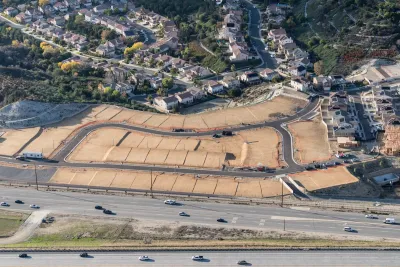A new state law significantly limits the power of CEQA, an environmental review law that served as a powerful tool for blocking new development.

A new California state law could upend a key environmental review law that some critics have blamed for exacerbating the housing crisis and blocking or delaying much-needed housing construction.
The California Environmental Quality Act (CEQA) has, historically, been one of the most powerful tools for environmentalists, historical preservationists, and others (including NIMBY activists) who oppose new development, explains Ben Christopher in CalMatters.
The law has been a double-edged sword, protecting important ecosystems and limiting sprawl, but also hindering housing development in a state where affordable housing is sorely needed. “That’s because the law allows any individual or group to sue if they argue that a required environmental study isn’t accurate, expansive or detailed enough. Such lawsuits — and even the mere threat of them —add a degree of delay, cost and uncertainty that make it impossible for the state to build its way to affordability, CEQA’s critics argue.”
Now, most new apartment buildings “will no longer face the open threat of environmental litigation” if located in already developed areas. The bill includes certain density requirements, precluding single-family development, and is limited to projects under 20 acres.
Although CEQA was, for years, a lynchpin of progressive environmental policy, the discourse has shifted as the state’s housing crisis has deepened and energy efficiency and climate issues have taken a more central role in public policy. “That infill focus has made it easier for the Democratic-controlled Legislature to swallow such a significant scaling back of California’s signature environmental law. Promoting denser urban development generally means using less land, constructing new housing that uses less energy and setting up new residents to do a lot less driving.”
FULL STORY: One of the biggest obstacles to building new CA housing has now vanished

Planetizen Federal Action Tracker
A weekly monitor of how Trump’s orders and actions are impacting planners and planning in America.

Maui's Vacation Rental Debate Turns Ugly
Verbal attacks, misinformation campaigns and fistfights plague a high-stakes debate to convert thousands of vacation rentals into long-term housing.

Restaurant Patios Were a Pandemic Win — Why Were They so Hard to Keep?
Social distancing requirements and changes in travel patterns prompted cities to pilot new uses for street and sidewalk space. Then it got complicated.

In California Battle of Housing vs. Environment, Housing Just Won
A new state law significantly limits the power of CEQA, an environmental review law that served as a powerful tool for blocking new development.

Boulder Eliminates Parking Minimums Citywide
Officials estimate the cost of building a single underground parking space at up to $100,000.

Orange County, Florida Adopts Largest US “Sprawl Repair” Code
The ‘Orange Code’ seeks to rectify decades of sprawl-inducing, car-oriented development.
Urban Design for Planners 1: Software Tools
This six-course series explores essential urban design concepts using open source software and equips planners with the tools they need to participate fully in the urban design process.
Planning for Universal Design
Learn the tools for implementing Universal Design in planning regulations.
Heyer Gruel & Associates PA
JM Goldson LLC
Custer County Colorado
City of Camden Redevelopment Agency
City of Astoria
Transportation Research & Education Center (TREC) at Portland State University
Jefferson Parish Government
Camden Redevelopment Agency
City of Claremont





























